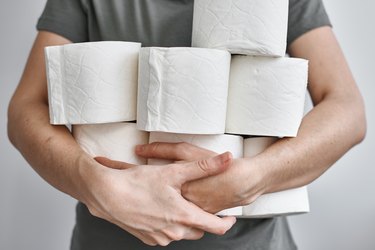
Let's face it: We all wipe our butts, and most of us do it at least once a day — likely without much thought. But there are plenty of ways to get wiping wrong, and they can lead to some less-than-rosy health effects.
To learn how we can all be kinder to our bums, we asked doctors to tell us their top tips to keep in mind when you reach for the TP.
Video of the Day
Video of the Day
Mistake 1: You Wipe From Back to Front
When you were first taught how to clean yourself post-poop, your parents probably showed you the front-to-back motion. This is exactly as it sounds — cleaning yourself with toilet paper starting at the front of your genital area and wiping in a backward motion past the anus.
It's vital to only go in this direction, since wiping back to front can increase the spread of harmful bacteria to the urethra, says board-certified internal medicine physician Sunitha Posina, MD. Women, especially, run a higher risk of exposing their urethra to unwanted bacteria (read: fecal matter), which can travel into the bladder. If this happens, it can lead to a urinary tract infection or other issues.
If you aren't able to reach behind your back for some reason, Dr. Posina suggests reaching in between your legs from the front and wiping backward from there.
Related Reading
Mistake 2: You Wipe Too Hard
It's not pretty — but we've all been there. After finishing your business, you can't seem to remove the, shall we say, excess off your backend. In an effort to get completely clean, you wipe harder and harder.
Try your best to avoid this habit, since it can cause an anal injury and lead to bleeding, pain and itching, says gastroenterologist Michael Dann, MD. As you likely already know, the perineal area is sensitive, and it's highly vascular, which means there are plenty of vessels and nerves that can become damaged. That's why Dr. Dann recommends using a patting motion when wiping, to clean the area gently.
Side note: If you ever have rectal pain, it's worthwhile to visit your doctor to ensure nothing more serious is happening down there.
Mistake 3: You Stand Up to Wipe
Once you've finished relieving yourself, do you stand to wipe? Or do you stay seated? The latter is the better option, says Dr. Posina.
It comes down to simple anatomy: When you're sitting, your buttocks are spread apart, allowing you to wipe the anal opening more easily. If you stand up, you naturally clench your cheeks together, making it less likely that you can get truly clean.
Related Reading
Mistake 4: You Reach for the Wrong Toilet Paper
Don't be hoodwinked by fancy claims on toilet paper packaging.
Dr. Posina suggests looking for some keywords as red flags. For example, if it's 'infused with aloe and vitamin E,' it could create a burning sensation if your skin is sensitive. If it's 'ultra-strong,' she says it could contain a formaldehyde that's not only considered a skin irritant, but may be linked to cancer. And though recycled toilet paper is better for the environment, these brands are typically harsher in texture, and thus, rougher on your bum.
Instead, keep it simple. Look for TP that uses unbleached paper free of dyes or perfumes. Her go-to is Seventh Generation Unbleached Toilet Paper.
Mistake 5: You Use Wet Wipes
You'd think using wet wipes over TP would be more hygienic and less traumatizing to your backside, but Dr. Dann says they can lead to other issues.
"Wet wipes can lead to a rash known as contact dermatitis because many contain fragrances and preservatives, like MCI (methylchloroisothiazolinone), which can damage the sensitive skin of the anus," he explains.
If you enjoy the feel and the ease of wet wipes, Dr. Dann suggests making your own, so you know they're free of all of the bad stuff. Here's how:
- Start with your favorite paper towel and cut in half.
- Place in a jar and add four cups of warm distilled or boiled water.
- Add a few drops of a gentle baby wash.
- Add one to two tablespoons of coconut oil.
- Let sit for 10 minutes and drain most of the water.
- Store in a tightly sealed container, and use as needed.
Is this an emergency? If you are experiencing serious medical symptoms, please see the National Library of Medicine’s list of signs you need emergency medical attention or call 911.